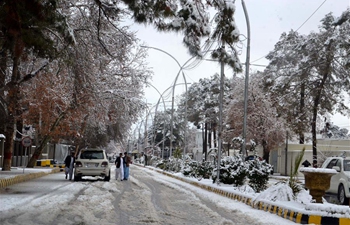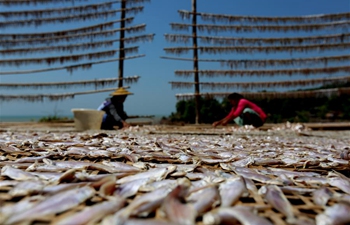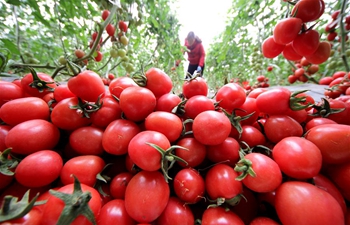XINING, March 4 (Xinhua) -- Ngawang Dawa will never forget the 15-day journey he took ten years ago to bring food and clothes to farmers and herders hit by a snowstorm.
Large amounts of snowfall made rescue effort extremely difficult, said Ngawang Dawa, then deputy county head of Zhidoi County, in Yushu Tibetan Autonomous Prefecture.
"We had bulldozers remove the snow so our cars could get through, but it was slow work. Many herders were low on food and fuel by the time we arrived in Sokya," he said. It took him and another cadre 15 days to reach the Sokya Township, the farthest township from the county seat.
In 2019 alone, over ten rounds of heavy snowstorms have hit Yushu, with drifts and snow piles as tall as two meters high, but this time Ngawang Dawa said he and his colleagues were better prepared.
Now the head of the poverty relief bureau in Yushu, Ngawang Dawa said the speed of response was faster, and losses were reduced to a tenth of those ten years ago.
Snowstorms in 2018 left 200,000 cattle dead. In 2019, only 26,000 cattle have died as a result of the snow. No human casualties have been reported.
More than 400,000 people live in the Yushu prefecture on the southwestern part of the Qinghai-Tibet Plateau. In 2018, 67,300 people in Yushu lived below the poverty line.
Precision and steadfast implementation of poverty relief policies led to better disaster preparedness with marked improvement in health, transportation and emergency shelter infrastructure.
BETTER INFRASTRUCTURE
From 2016 to 2018, a total of 3,806 km of roads were built in Yushu, improving transportation for over 112,000 people.
After the snowstorms hit, excavators were brought in to clean the snow off the road so food and animal feed could be supplied to the disaster-stricken areas, said Ngawang Dawa.
Animal shelters and oat grass reserves that were established using poverty relief funds were enough to sustain the animals through the storms.
Government officials acted promptly to assist the vulnerable communities through the natural disaster, as mandated by the nationwide poverty relief campaign, officials said.
Herder Tsangyu Tsering broke both of his legs right ahead of an intense snowstorm in February. He received timely assistance as local cadres and rescuers lost no time in locating him and bringing him to a nearby clinic.
In the past three years, 189 new clinics were built in Yushu, including the one where Tsangyu Tsering received treatment.
After the snowstorms hit, doctors were sent to make rounds in their communities to offer help to those in need, said Drawasong, head of a township clinic in Zadoi County.
IMPROVED LIVELIHOOD
The resettlement of residents from extremely challenging environments to more hospitable areas puts locals in better positions to deal with disasters.
Tamdrun, a 48-year-old woman, is relieved that her husband is recovering from rheumatism in their new home. A former herder in the mountains, Tamdrun lived far away from the county seat, and a single journey to the nearest pharmacy was 120 km.
In November last year, the family received a government subsidy to move to a new home in the Qingshuihe Township, about 100 km from their old residence.
In Yushu, a total of 7,020 people have been resettled into better living environments. Another 334 million yuan (about 49 million U.S. dollars) was spent on renovating old and dilapidated houses.
Herding is a mainstay industry in Yushu. Compared with individual herders, cooperatives suffered fewer losses from the blizzards.
Jamtsering runs an animal farming cooperative of 45 families in Zhidoi County. His cooperative helps individual herders ward off risks which they could not have dealt with alone, he said.
"With improved facilities and preventive measures, we're in a better position to deal with harsh weather and protect our cattle," he said.

















